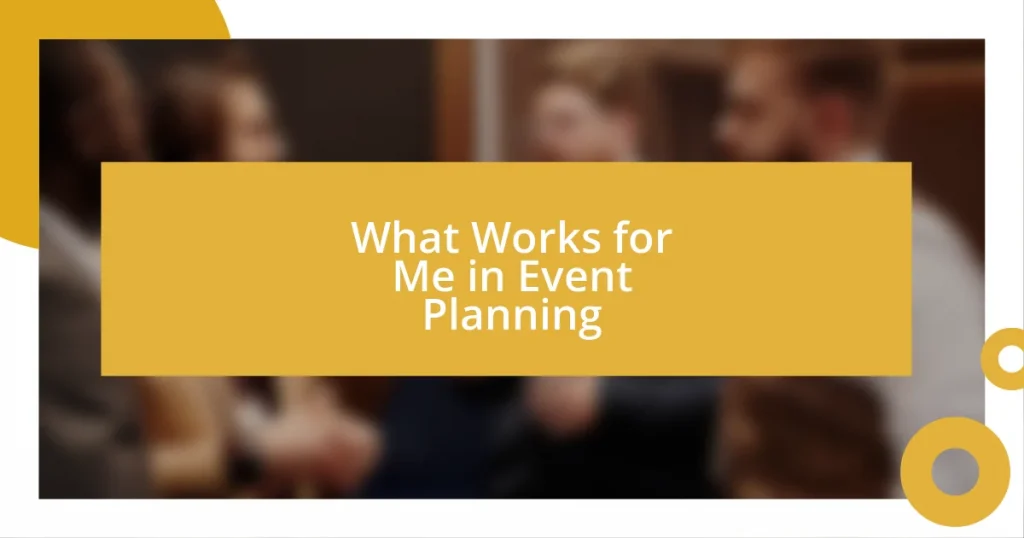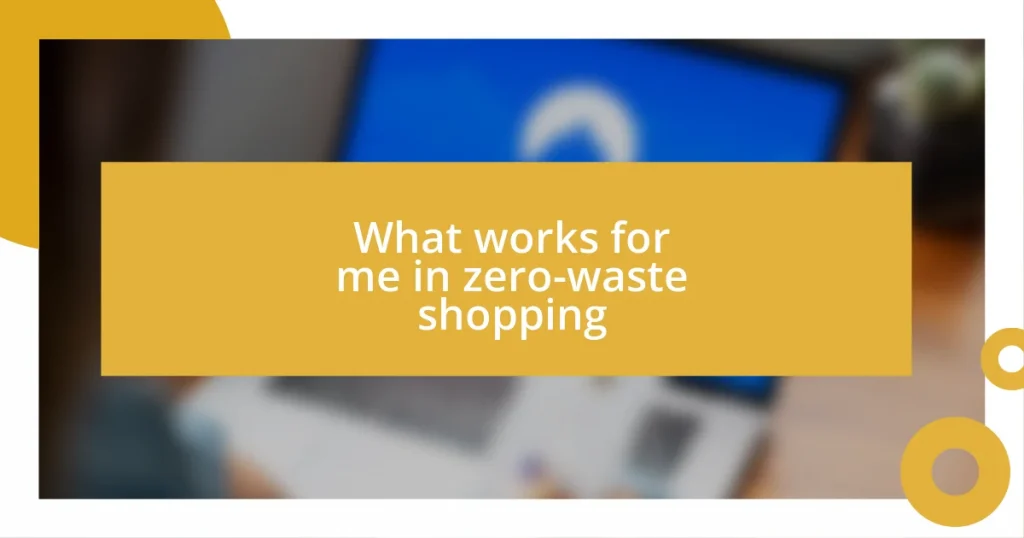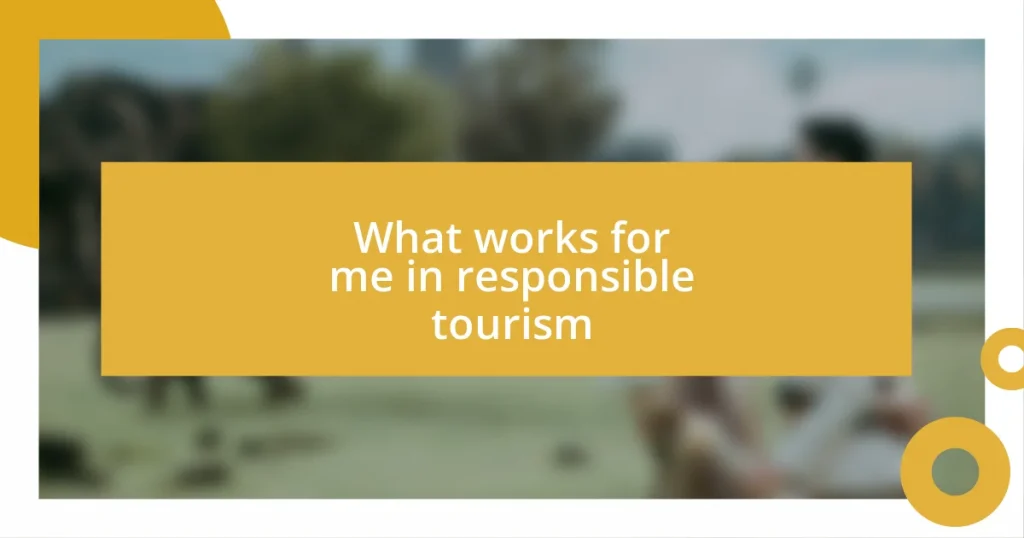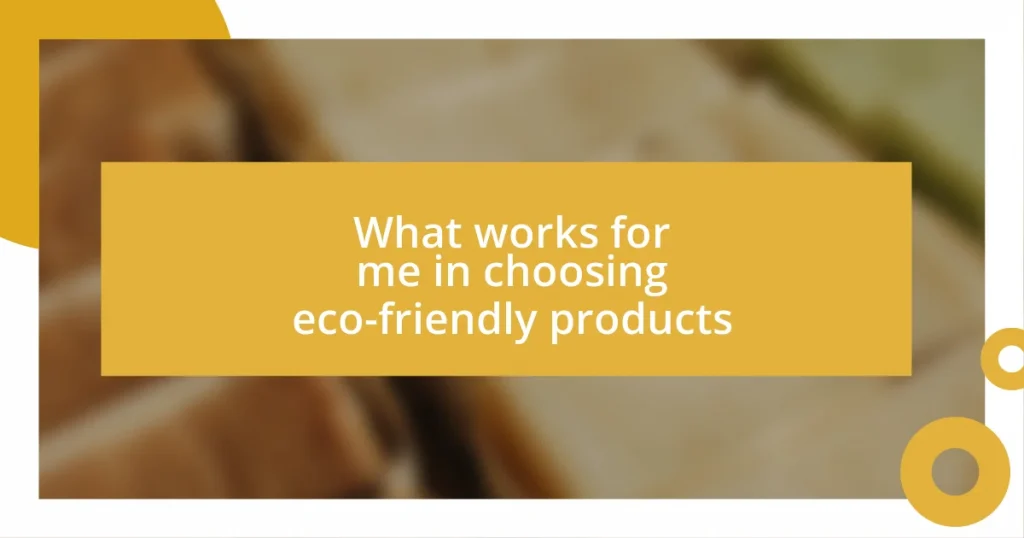Key takeaways:
- Establish clear event goals and a budget to guide planning and prevent unexpected costs.
- Create a detailed and flexible event timeline to ensure organization and adaptability during unforeseen changes.
- Engage meaningfully with vendors and attendees to enhance the event experience and gather valuable feedback for future improvements.
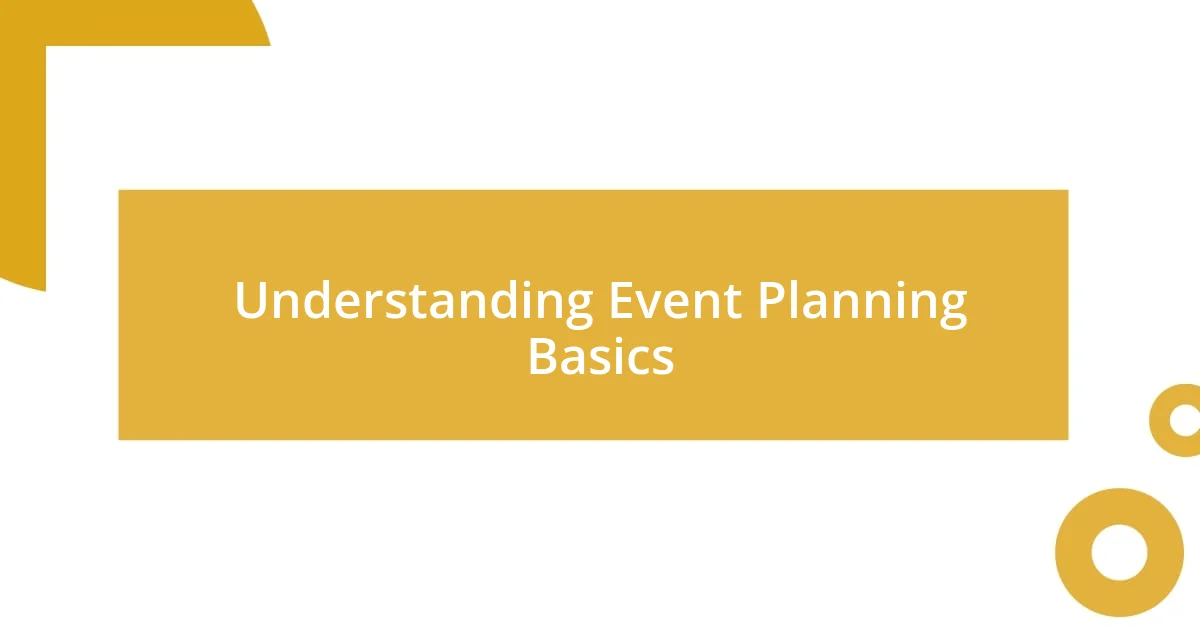
Understanding Event Planning Basics
Event planning is a multifaceted process that combines creativity, organization, and communication. I remember the first event I ever planned—it was a small party for a friend. I felt a mix of excitement and anxiety, but I quickly learned the importance of having a solid checklist. This not only helped me stay on track but also eased my nerves. Do you have a method that you use to keep yourself organized?
One essential element in event planning is understanding the purpose of the event. Whether it’s a corporate meeting or a personal celebration, each event has its unique goals. During my experience planning a charity event, I found that defining our mission early on helped align our efforts. It created a sense of community and purpose among the team and made decision-making much smoother.
Budgeting is another critical component that can make or break an event. I recall a time when I didn’t account for all the little expenses—those hidden costs can pile up! By setting a realistic budget and sticking to it, I not only managed to enhance my planning skills but also reduced last-minute stress. Have you ever faced unexpected costs? I’ve learned that anticipating these can truly save the day.

Identifying Event Goals and Objectives
When I approach identifying event goals and objectives, I always start with a reflective mindset. For instance, in organizing a workshop, I took a moment to consider what success looked like. By visualizing the outcomes, such as participant engagement and knowledge retention, I was able to tailor every aspect of the event to meet those objectives. This clarity not only kept my focus sharp but also motivated the team, creating a shared vision.
Here are a few key questions I ask myself to solidify event goals and objectives:
– What is the primary purpose of the event?
– Who is the target audience, and what do they hope to gain?
– What message or experience do I want attendees to walk away with?
– How will I measure success after the event?
– What specific outcomes are essential for the event’s success?
By considering these factors, I find it becomes much easier to keep the planning process aligned with the desired outcomes. Each objective serves as a guiding star, ensuring every decision I make contributes to the bigger picture.
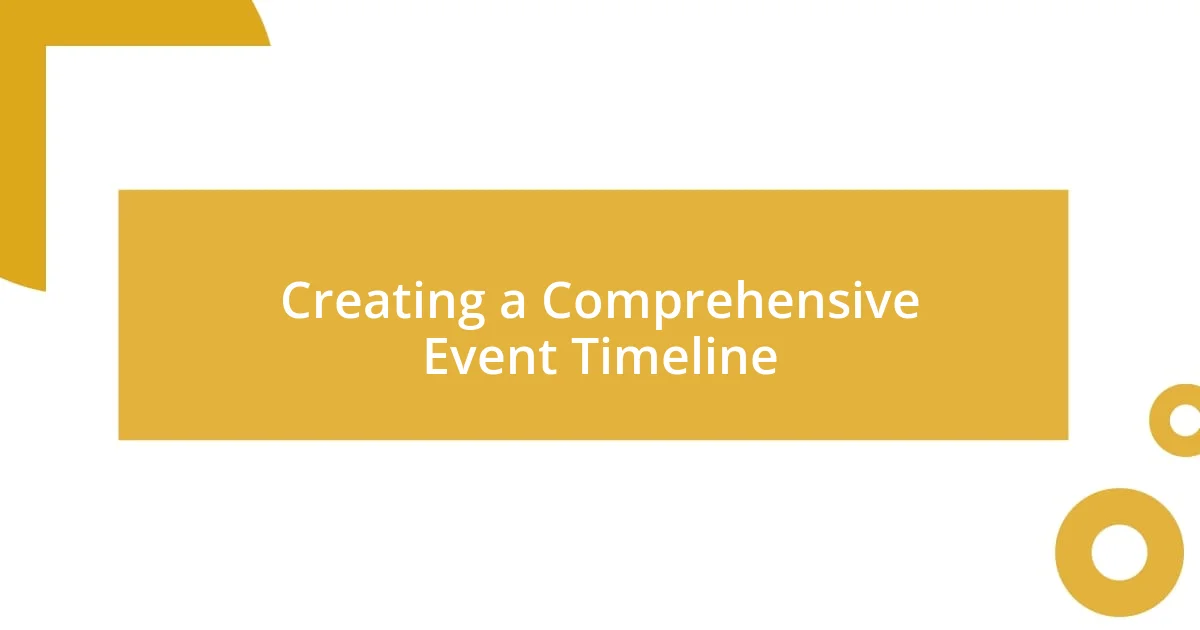
Creating a Comprehensive Event Timeline
Creating a detailed event timeline is something I can’t emphasize enough. In my experience, having a structured timeline not only keeps the planning process organized but also ensures that no essential detail is overlooked. I recall a gala I organized where I broke down the timeline into key phases, from booking vendors to finalizing the guest list. This systematic approach allowed me to breathe easy, knowing everything was in place well before the event day.
What works for me is using specific dates alongside clear milestones, so I can monitor my progress. For example, I like to set goals for when deposits are due and when to confirm attendees. Those small victories felt like stepping stones, making the entire process less overwhelming and much more manageable. Have you ever tried segmenting your tasks like this? I find it helps many planners feel a sense of achievement throughout their journey.
Additionally, I’m a firm believer in flexibility within that timeline. Events are dynamic, and sometimes things don’t go as planned. During one outdoor festival, unexpected weather forced us to re-evaluate our timeline on the fly. Being able to adapt while sticking to an overall plan made a real difference in reducing stress, ultimately allowing the event to flow smoothly despite the changes.
| Benefits of a Comprehensive Event Timeline | Potential Drawbacks |
|---|---|
| Enhanced organization and clarity | Can create rigidity |
| Improves time management | May overlook flexibility |
| Promotes accountability within the team | Requires diligent updates |
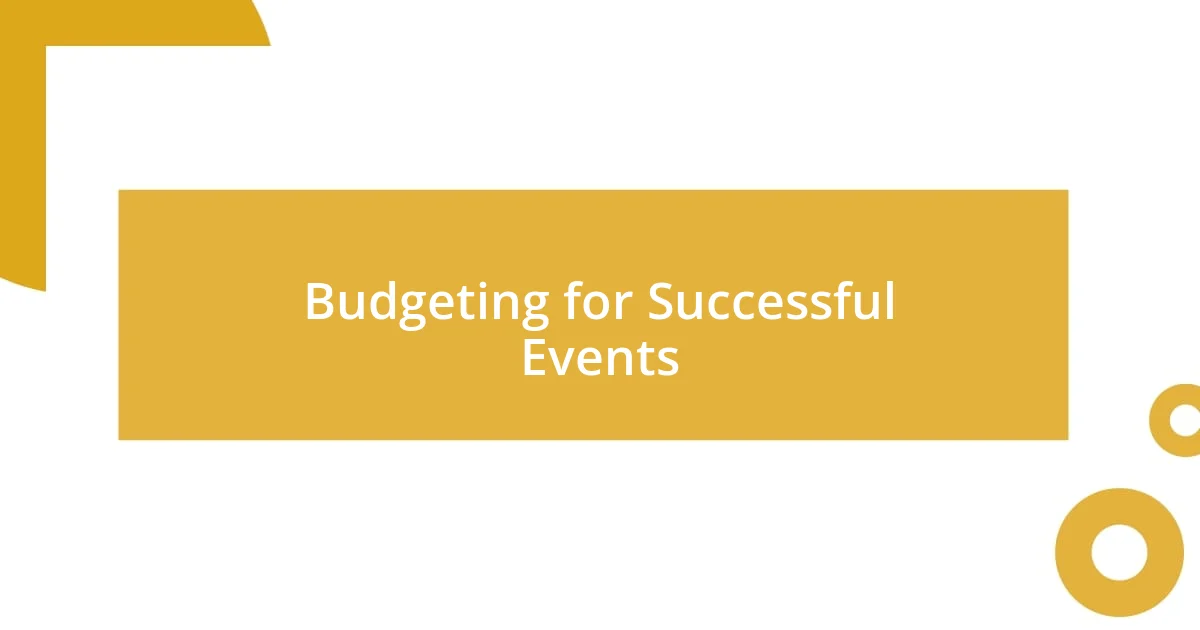
Budgeting for Successful Events
Budgeting is often the backbone of successful event planning. I’ve learned that laying out a realistic budget not only helps to manage resources efficiently but also prevents those dreaded last-minute financial surprises. For instance, during a fundraising event I organized, an accurate budget allowed us to allocate funds precisely where they were needed—right down to the entertainment and catering. It felt so gratifying to stick to our limits while maximizing the event’s potential!
Have you ever found yourself in a situation where unexpected costs cropped up? I certainly have, which is why I always build a contingency fund into my budget. A few years ago, during a corporate retreat, an unforeseen venue fee threatened to derail our plans. Luckily, I had set aside a small percentage of the total budget specifically for incidents like this. What a relief it was to address the issue without breaking a sweat!
Moreover, transparency in budgeting fosters trust and collaboration among team members. I remember when we were planning a community festival, and I shared the budget breakdown with my volunteers. Engaging them in discussions about spending made them feel valued and encouraged them to contribute ideas that aligned with our financial parameters. This not only strengthened the team’s commitment but also allowed us to brainstorm creative solutions that enhanced our overall offerings. Have you considered how open communication regarding finances can enhance your team’s dynamics?

Choosing the Right Venue
Choosing the right venue is one of those pivotal decisions that can really set the tone for an event. I remember one corporate conference I planned where the venue was a game-changer. We opted for a space that not only accommodated our attendees comfortably but also reflected the professional image we aimed to project. It’s amazing how the right environment can enhance the guest experience and even boost engagement.
In my experience, it’s crucial to consider the venue’s accessibility. I once chose a beautiful venue in a remote location, thinking it added charm. However, I quickly learned that limited access led to late arrivals and frustrated guests. I now brainstorm how attendees will reach the venue, including parking and public transport options. It truly matters when it comes to ensuring everyone can enjoy the event without added stress.
Another piece of advice is to choose a venue that offers flexibility in layout. I vividly recall organizing a wedding where the couple wanted a unique, non-traditional reception style. The flexibility of our chosen venue allowed us to set up lounge areas alongside traditional dining tables, creating a vibrant atmosphere. Have you thought about how layout options can transform your event? A versatile space can really open the door to creativity and a memorable experience for everyone involved.

Engaging and Managing Vendors
Engaging and managing vendors can truly make or break an event. I remember a gala I was involved in where my caterer was not only talented but responsive. After a few calls to discuss menu ideas, we hit on a theme that resonated with our audience, and seeing the vendor so invested made me excited about the outcome. Have you ever noticed how enthusiasm from your vendors translates into the event’s overall energy?
Building strong relationships with vendors is essential. Once, I collaborated with a florist who was more than willing to go the extra mile. When our original floral arrangements went awry due to delivery issues, their willingness to pivot and create a new design last minute saved the day. It taught me the importance of keeping lines of communication open and truly valuing their expertise. How often do you check in with your vendors to ensure they feel like part of the planning team?
I find that turnover can be a real challenge in vendor management. For one event, we had to source a new AV supplier just weeks before the big day! Thankfully, my previous connections in the industry helped me secure a reliable team who could not only meet our needs but exceeded our expectations. It really reinforced my belief that maintaining relationships with vendors—even if they aren’t used for a specific event—pays off in spades down the road. Have you considered how your network can be a safety net in times of need?

Evaluating Event Success and Feedback
Evaluating Event Success and Feedback
Evaluating an event’s success goes beyond just numbers; it’s about the feelings and experiences of the attendees. After one of my seminars, I felt a wave of relief when the feedback forms started pouring in. They were filled with positive notes about the engaging content and interaction. It made me realize how important it is to connect with participants and create an experience that resonates with them. Have you ever considered how attendee emotions can be a critical component of success?
To gauge this emotional impact, I’ve implemented a quick survey right after the event wraps up. These aren’t just your standard “Rate from 1-10” questions; I include open-ended prompts that invite attendees to share their thoughts. In one case, a guest mentioned how a small networking break sparked a meaningful connection that led to a collaboration. This kind of feedback is pure gold! I can’t stress enough how it shapes my future events by revealing what really matters to my audience. Are you tapping into the power of qualitative feedback?
I also encourage informal chats during and after the event—these casual conversations can reveal so much more than structured forms. I remember chatting with a group of attendees after a workshop and learning that they felt overwhelmed by the workload post-event. This insight prompted me to incorporate follow-up resources in future plans. Regularly engaging with your audience in this way can elevate your event planning strategy and help you address needs you might overlook otherwise. How do you stay connected with your attendees beyond the event itself?










